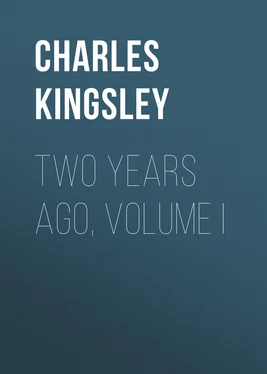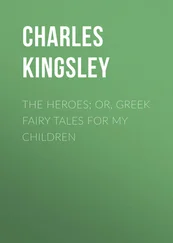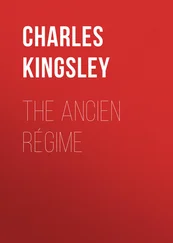Charles Kingsley - Two Years Ago, Volume I
Здесь есть возможность читать онлайн «Charles Kingsley - Two Years Ago, Volume I» — ознакомительный отрывок электронной книги совершенно бесплатно, а после прочтения отрывка купить полную версию. В некоторых случаях можно слушать аудио, скачать через торрент в формате fb2 и присутствует краткое содержание. Жанр: foreign_prose, literature_19, foreign_antique, на английском языке. Описание произведения, (предисловие) а так же отзывы посетителей доступны на портале библиотеки ЛибКат.
- Название:Two Years Ago, Volume I
- Автор:
- Жанр:
- Год:неизвестен
- ISBN:нет данных
- Рейтинг книги:5 / 5. Голосов: 1
-
Избранное:Добавить в избранное
- Отзывы:
-
Ваша оценка:
- 100
- 1
- 2
- 3
- 4
- 5
Two Years Ago, Volume I: краткое содержание, описание и аннотация
Предлагаем к чтению аннотацию, описание, краткое содержание или предисловие (зависит от того, что написал сам автор книги «Two Years Ago, Volume I»). Если вы не нашли необходимую информацию о книге — напишите в комментариях, мы постараемся отыскать её.
Two Years Ago, Volume I — читать онлайн ознакомительный отрывок
Ниже представлен текст книги, разбитый по страницам. Система сохранения места последней прочитанной страницы, позволяет с удобством читать онлайн бесплатно книгу «Two Years Ago, Volume I», без необходимости каждый раз заново искать на чём Вы остановились. Поставьте закладку, и сможете в любой момент перейти на страницу, на которой закончили чтение.
Интервал:
Закладка:
"How then!"
"Why, as if man was made for the Church, and not the Church for man."
"That is a shrewd thought, at least. Where did you pick it up?"
"'Tis none of my own, sir; a bit of wisdom that my maid let fall; and it has stuck to me strangely ever since."
"Your maid?"
"Yes, Grace there. I always call her my maid; having no father, poor thing, she looks up to me as one, pretty much,—the dear soul. Oh, sir! I hope you'll think over this again, before you do anything. It's done in a day: but years won't undo it again."
So Grace's sayings were quoted against him. Her power was formidable enough, if she dare use it. He was silent awhile, and then—
"Do you think she has heard of this—of my—"
"Honesty's the best policy, sir: she has; and that's the truth. You know how things get round."
"Well; and what did she say?"
"I'll tell you her very words, sir; and they were these, if you'll excuse me. 'Poor dear gentleman,' says she, 'if he thinks chapel-going so wrong, why does he dare drive folks to chapel? I wonder, every time he looks at that deep sea, he don't remember what the Lord said about it, and those who cause his little ones to offend.'"
Frank was somewhat awed. The thought was new; the application of the text, as his own scholarship taught him, even more exact than Grace had fancied.
"Then she was not angry?"
"She, sir! You couldn't anger her if you tore her in pieces with hot pincers, as they did those old martyrs she's always telling about."
"Good-bye, Willis," said Frank, in a hopeless tone of voice, and sauntered to the pier-end, down the steps, and along the lower pier-way, burdened with many thoughts. He came up to the knot of chatting sailors. Not one of them touched his cap, or moved out of the way for him. The boat lay almost across the whole pier-way; and he stopped, awkwardly enough, for there was not room to get by.
"Will you be so kind as to let me pass?" asked he, meekly enough. But no one stirred.
"Why don't you get up, Tom?" asked one.
"I be lame."
"So be I."
"The gentleman can step over me, if he likes," said big Jan; a proposition the impossibility whereof raised a horse-laugh.
"Ain't you ashamed of yourselves, lads?" said the severe voice of Willis, from above. The men rose sulkily; and Frank hastened on, as ready to cry as ever he had been in his life. Poor fellow! he had been labouring among these people for now twelve months, as no man had ever laboured before, and he felt that he had not won the confidence of a single human being,—not even of the old women, who took his teaching for the sake of his charity, and who scented popery, all the while, in words in which there was no popery, and in doctrines which were just the same, on the whole, as those of the dissenting preacher, simply because he would sprinkle among them certain words and phrases which had become "suspect," as party badges. His church was all but empty; the general excuse was, that it was a mile from the town: but Frank knew that that was not the true reason; that all the parish had got it into their heads that he had a leaning to popery; that he was going over to Rome; that he was probably a Jesuit in disguise.
Now, be it always remembered, Frank Headley was a good man, in every sense of the word. He had nothing, save the outside, in common with those undesirable coxcombs, who have not been bred by the High Church movement, but have taken refuge in its cracks, as they would have done forty years ago in those of the Evangelical,—youths who hide their crass ignorance and dulness under the cloak of Church infallibility, and having neither wit, manners, learning, humanity, or any other dignity whereon to stand, talk loud, pour pis aller , about the dignity of the priesthood. Such men Frank had met at neighbouring clerical meetings, overbearing and out-talking the elder and the wiser members; and finding that he got no good from them, had withdrawn into his parish-work, to eat his own heart, like Bellerophon of old. For Frank was a gentleman and a Christian, if ever one there was. Delicate in person, all but consumptive; graceful and refined in all his works and ways; a scholar, elegant rather than deep, yet a scholar still; full of all love for painting, architecture, and poetry, he had come down to bury himself in this remote curacy, in the honest desire of doing good. He had been a curate in a fashionable London Church; but finding the atmosphere thereof not over wholesome to his soul, he had had the courage to throw off St. Nepomuc's, its brotherhoods, sisterhoods, and all its gorgeous and highly-organised appliances for enabling five thousand rich to take tolerable care of five hundred poor: and had fled from "the holy virgins" (as certain old ladies, who do twice their work with half their noise, call them) into the wilderness of Bethnal Green. But six months' gallant work there, with gallant men (for there are High Churchmen there who are an honour to England), brought him to death's door. The doctors commanded some soft western air. Frank, as chivalrous as a knight-errant of old, would fain have died at his post, but his mother interfered; and he could do no less than obey her. So he had taken this remote west country curacy; all the more willingly because he knew that nine-tenths of the people were Dissenters. To recover that place to the Church would be something worth living for. So he had come, and laboured late and early; and behold, he had failed utterly; and seemed farther than ever from success. He had opened, too hastily, a crusade against the Dissenters, and denounced where he should have conciliated. He had overlooked—indeed he hardly knew—the sad truth, that the mere fact of his being a clergyman was no passport to the hearts of his people. For the curate who preceded him had been an old man, mean, ignorant, incapable, remaining there simply because nobody else would have him, and given to brandy-and-water as much as his flock.
The rector for the last fifteen years, Lord Scoutbush's uncle, was a cypher. The rector before him had notoriously earned the living by a marriage with a lady who stood in some questionable relation to Lord Scoutbush's father, and who had never had a thought above his dinner and his tithes; and all that the Aberalva fishermen knew of God or righteousness, they had learnt from the soi-disant disciples of John Wesley. So Frank Headley had to make up, at starting, the arrears of half-a-century of base neglect; but instead of doing so, he had contrived to awaken against himself that dogged hatred of popery which lies inarticulate and confused, but deep and firm, in the heart of the English people. Poor fellow! if he made a mistake, he suffered for it. There was hardly a sadder soul than poor Frank, as he went listlessly up the village street that afternoon, to his lodging at Captain Willis's, which he had taken because he preferred living in the village itself to occupying the comfortable rectory a mile out of town.
However we cannot set him straight;—after all, every man must perform that office for himself. So the best thing we can do, as we landed, naturally, at the pier-head, is to walk up-street after him, and see what sort of a place Aberalva is.
Beneath us, to the left hand, is the quay-pool, now lying dry, in which a dozen trawlers are lopping over on their sides, their red sails drying in the sun, the tails of the trawls hauled up to the topmast heads; while the more handy of their owners are getting on board by ladders, to pack away the said red sails; for it will blow to night. In the long furrows which their keels have left, and in the shallow muddy pools, lie innumerable fragments of exenterated maids (not human ones, pitiful reader, but belonging to the order Pisces, and the family Raia), and some twenty non-exenterated ray-dogs and picked dogs (Anglice, dog-fish), together with a fine basking shark, at least nine feet long, out of which the kneeling Mr. George Thomas, clothed in pilot cloth patches of every hue, bright scarlet, blue and brown (not to mention a large square of white canvas which has been let into that part of his trousers which is now uppermost), is dissecting the liver for the purpose of greasing his "sheaves" with the fragrant oil thereof. The pools in general are bedded with black mud, and creamed over with oily flakes which may proceed from the tar on the vessels' sides, and may also from "decomposing animal matter," as we euphemise it now-a-days. The hot pebbles, at high-tide mark,—crowned with a long black row of herring and mackerel boats, laid up in ordinary for the present—are beautifully variegated with mackerels' heads, gurnets' fins, old hag, lobworm, and mussel-baits, and the inwards of a whole ichthyological museum; save at one spot where the Cloaca maxima and Port Esquiline of Aberalva town (small enough, considering the place holds fifteen hundred souls) murmurs from beneath a grey stone arch toward the sea, not unfraught with dead rats and cats, who, their ancient feud forgotten, combine lovingly at last in increasing the health of the blue-trousered urchins who are sailing upon that Acherontic stream bits of board with a feather stuck in it, or of their tiny sisters who are dancing about in the dirtiest pool among the trawlers in a way which (if your respectable black coat be seen upon the pier) will elicit from one of the balconied windows above, decked with reeking shirts and linen, some such shriek as—
Читать дальшеИнтервал:
Закладка:
Похожие книги на «Two Years Ago, Volume I»
Представляем Вашему вниманию похожие книги на «Two Years Ago, Volume I» списком для выбора. Мы отобрали схожую по названию и смыслу литературу в надежде предоставить читателям больше вариантов отыскать новые, интересные, ещё непрочитанные произведения.
Обсуждение, отзывы о книге «Two Years Ago, Volume I» и просто собственные мнения читателей. Оставьте ваши комментарии, напишите, что Вы думаете о произведении, его смысле или главных героях. Укажите что конкретно понравилось, а что нет, и почему Вы так считаете.












